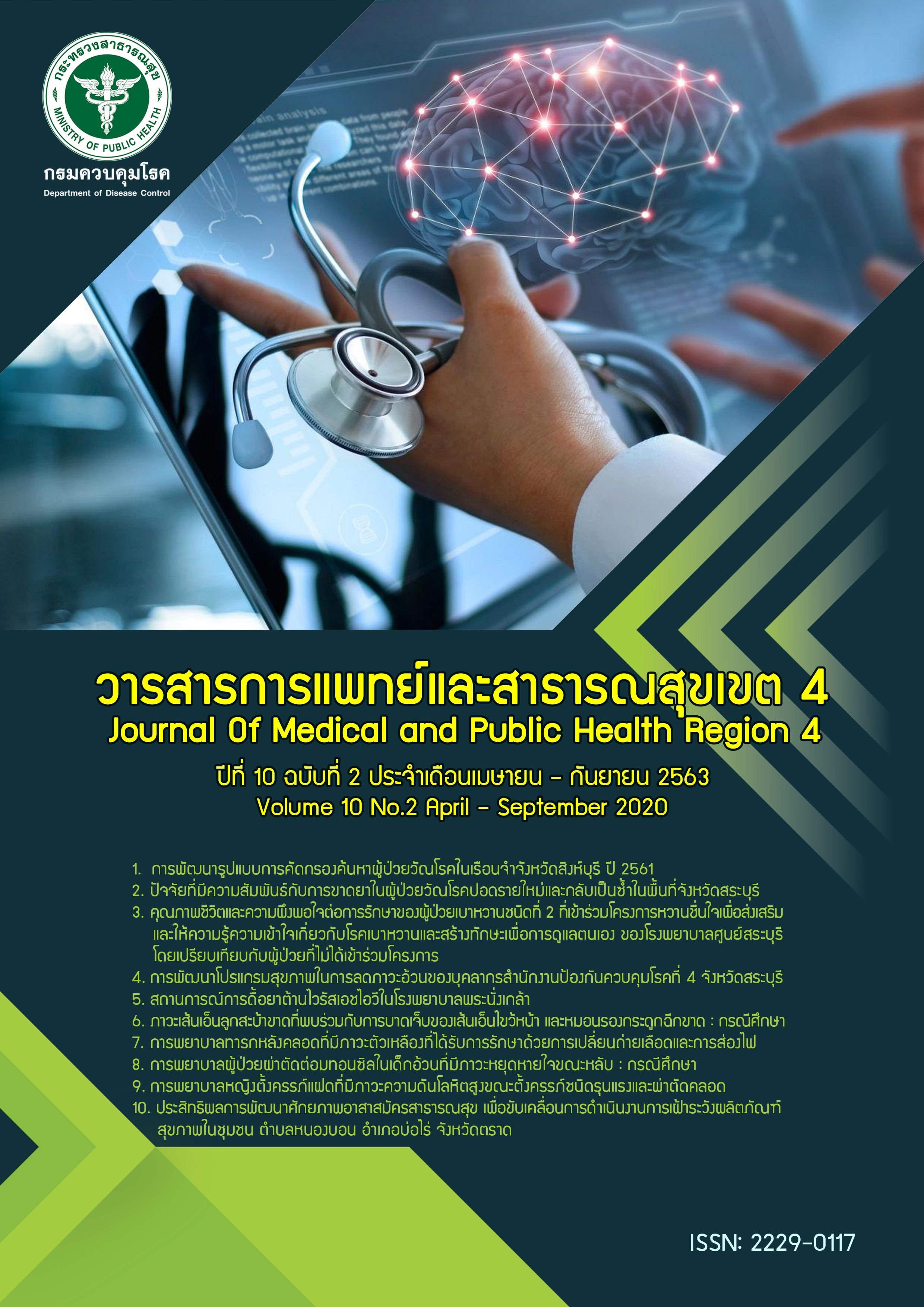การพัฒนาโปรแกรมสุขภาพในการลดภาวะอ้วน ของบุคลากรสำนักงานป้องกันควบคุมโรคที่ 4 จังหวัดสระบุรี
Main Article Content
Abstract
The purpose of this research was to study the development of health program to reduce obesity of Personnel at the Office of Disease Prevention and Control, Region 4 Saraburi. The study was a Quasi-Experimental Research. The duration of the study was 16 weeks. The sample consisted of personnel at the Office of Disease Prevention and Control, Region 4 Saraburi who were obese. The subjects were 30 volunteers by selecting the purposive sampling. Data were collected by questionnaire were divided into three parts 1) the Questionnaire of general information, 2) the questionnaire of health behaviour and 3) the questionnaire of perceived self-efficacy. And use a health program for reduce obesity using 4 techniques of self-efficacy theory. Data were analyzed by using the frequency and percentage. Chi-Square was applied to analyze the results showed that the factors that are correlated with obesity. The paired t-test was applied to analyze the health behavior, perceived self-efficacy, body weight, body mass index and waist circumference, prior to and after the program. The results of this study were after participating in the program of obeseness personnel at the Office of Disease Prevention and Control, Region 4 Saraburithe, have a mean score of health behaviour and perceived self-efficacy higher than before joining the program, but not statistically different. After joining the program, decreased have a weight average, body mass index and waist circumference with statistical significance at the level of 0.05. In conclusion, the health program causing of obeseness personnel at the Office of Disease Prevention and Control, Region 4 Saraburithe has healthy behaviour and perceived self-efficacy in weight control improved, resulting in body weight, body mass index and waist circumference decreases.
Article Details
References
2. วิชัย เอกพลากร. รายงานการสำรวจสุขภาพประชาชนไทยโดยการตรวจร่างกาย ครั้งที่ 5 พ.ศ.2557. พิมพ์ครั้งที่ 1. กรุงเทพมหานคร: สำนักพิมพ์อักษรกราฟฟิคแอนด์ดีไซน์; 2559.
3. World Health Organization. Obesity and overweight [internet]. 2018 [cited 2018 December 1]. Available from: https://www.who.int/news-room/fact-sheets/detail/obesity-and-overweight
4. สำนักงานกองทุนสนับสนุนการสร้างสุขภาพ. คนไทยเป็นโรคอ้วนอันดับ 2 ของอาเซียน [อินเตอร์เน็ต]. 2557 [เข้าถึงเมื่อ 23 พฤศจิกายน 2561]. เข้าถึงได้จาก: https://bit.ly/1qv4E7V
5. กรมอนามัย. สำนักโภชนาการ. เกณฑ์มาตรฐานอาหารทางเลือกเพื่อสุขภาพสำหรับกลุ่มเสี่ยง ผู้ป่วยเบาหวาน และความดันโลหิตสูง. กระทรวงสาธารณสุข. พิมพ์ครั้งที่ 1. สมุทรสาคร: บอร์น ทู บี พับลิชชิ่ง; 2556.
6. World Health Organization. The World Health Report 2002 - Reducing risks, promoting healthy life. Geneva: World Health Organization; 2002.
7. สำนักงานป้องกันควบคุมโรคที่ 4 จังหวัดสระบุรี. กลุ่มพัฒนาระบบบริหารองค์กร. รายงานผลการสำรวจแบบคัดกรองความเสี่ยงสุขภาพต่อสุขภาพของบุคลากรสำนักงานป้องกันควบคุมโรคที่ 4 จังหวัดสระบุรี. สระบุรี: เอกสารอัดสำเนา; 2560.
8. สำนักงานป้องกันควบคุมโรคที่ 4 จังหวัดสระบุรี. กลุ่มพัฒนาระบบบริหารองค์กร. รายงานผลการสำรวจสุขภาพของบุคลากรสำนักงานป้องกันควบคุมโรคที่ 4 จังหวัดสระบุรี. สระบุรี: เอกสารอัดสำเนา; 2561
9. Bandura, A. Social Foundation of Thought and Action: A Social cognitive theory. New Jersey: Prentice – Hall; 1986
10. กรมสนับสนุนบริการสุขภาพ. กองสุขศึกษา. การเสริมสร้างและประเมินความรอบรู้ด้านสุขภาพและพฤติกรรมสุขภาพ. ม.ป.ท.: 2561
.
11. ภิษฐ์จีรัชญ์ พัชรกุลธนา, กมลทิพย์ ขลังธรรมเนียม, วนิดา ดุรงค์ฤทธิชัย. ปัจจัยที่มีความสัมพันธ์ต่อการเกิดโรคอ้วนในกลุ่มวัยผู้ใหญ่ เขตเทศบาลตำบลเสาธง จังหวัดสมุทรปราการ. วารสารพยาบาลทหารบก. 2558;16(2):131-139.
12. ศักดิ์ชาย ควรระงบ. กระบวนการปรับเปลี่ยนพฤติกรรมเพื่อควบคุมน้ำหนักตัวของบุคลากรของมหาวิทยาลัยพายับ. วารสารพยาบาลสาร. 2557;41(1):85-95.
13. รุสนี วาอายีตา, กรรณิกา เรืองเดช, บุญสิทธิ์ ไชยชนะ, พบูรณ์ ชาวสวนศรีเจริญ. ประสิทธิผลของโปรแกรมปรับเปลี่ยนพฤติกรรมสุขภาพต่อการรับรู้ความสามารถของตนเอง การกํากับตนเองพฤติกรรมการดูแลตนเอง และการลดน้ำหนักของบุคลากรที่มีภาวะน้ำหนักเกิน โรงพยาบาลรามัน จังหวัดยะลา. วารสารพยาบาลกระทรวงสาธารณสุข. 2557; 24(2):90-104.
14. นวรัตน์ โกมลวิภาต, วิลาวัลย์ อุดมการเกษตร. ประสิทธิผลของโปรแกรมส่งเสริมการรับรู้ความสามารถในตนเองต่อพฤติกรรมสุขภาพ น้ำหนัก และเส้นรอบเอว ของนักศึกษาพยาบาลที่มีภาวะโภชนาการเกิน. วารสารพยาบาลสงขลานครินทร์. 2560;37(2):118-131.
15. ศุภชัย สามารถ, จุฬาภรณ์ โสตะ. ประสิทธิผลของโปรแกรมสุขศึกษาโดยการประยุกต์ใช้ความสามารถตนเอง ร่วมกับขั้นตอนการเปลี่ยนแปลงพฤติกรรมเพื่อลดน้ำหนักในกลุ่มวัยทำงานอายุ 40-49 ปี ที่มีภาวะน้ำหนักเกินและโรคอ้วน ตำบลหนองกุงเชิง อำเภอภูเวียง. วารสารสำนักงานป้องกันควบคุมโรคที่ 7 จังหวัดขอนแก่น. 2559;23(3):34-45.


